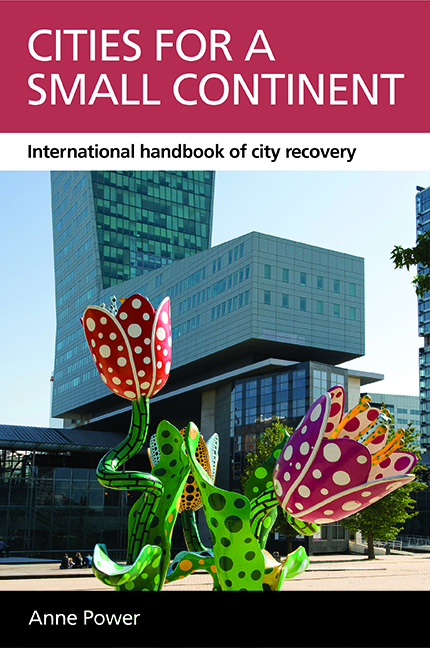Book contents
- Frontmatter
- Contents
- List of tables and figures
- Abbreviations and acronyms
- Acknowledgements
- Copyright material
- Foreword
- one Lessons from cities in a crowded continent Tale of a city – Bilbao
- two Divided and united Europe Tale of a city – Belfast
- three Grit and vision Tale of a city – Sheffield
- four Struggle and strive Tale of a city – Lille
- five Threats and opportunities Tale of a city – St Étienne
- six Over-scale and under-scale Tale of a city – Torino
- seven The power of social innovation Tale of a city – Leipzig
- eight Shoots of growth in older industrial cities in the US Tale of a city – Detroit
- nine Finding new ways out of the woods
- Endnotes
- References
- Afterword
- La Fabrique de la Cité
- Index
two - Divided and united Europe Tale of a city – Belfast
Published online by Cambridge University Press: 01 September 2022
- Frontmatter
- Contents
- List of tables and figures
- Abbreviations and acronyms
- Acknowledgements
- Copyright material
- Foreword
- one Lessons from cities in a crowded continent Tale of a city – Bilbao
- two Divided and united Europe Tale of a city – Belfast
- three Grit and vision Tale of a city – Sheffield
- four Struggle and strive Tale of a city – Lille
- five Threats and opportunities Tale of a city – St Étienne
- six Over-scale and under-scale Tale of a city – Torino
- seven The power of social innovation Tale of a city – Leipzig
- eight Shoots of growth in older industrial cities in the US Tale of a city – Detroit
- nine Finding new ways out of the woods
- Endnotes
- References
- Afterword
- La Fabrique de la Cité
- Index
Summary
A pioneer plant is one that can grow in harsh conditions and in poor soils, but is able to improve the area where it grows to make it suitable for other plants. Pioneer species are hardy species which are the first to colonise previously disrupted or damaged ecosystems.
Box 2.1: Belfast – a story
Arriving into the port of Belfast by night ferry from Birkenhead reminds the visitor just how distant Belfast is from other British cities. It has a battle-torn history like no other.
John Hume, founder and leader of Northern Ireland's Social Democratic Labour Party, in 1998, won the Nobel Peace Prize for his tireless and often dangerous efforts to end the violence that almost tore Derry, his own city, Belfast, and his country apart for 30 years. The Republican fight for independence against the Unionist fight to remain part of Britain threatened to destroy Ireland, just as the Second World War had threatened to destroy Europe. Internal violence and deep sectarian divisions pushed Hume into a peace-brokering role amid the ugly ‘Troubles’. A crowded community hall in North London in 2001 heard this quietly spoken Member of the European Parliament and member of Northern Ireland’s own restored parliament at Stormont Castle explain how Europe became a key to peace in Ireland.
On his first visit to Strasbourg, home of the European Parliament, in the early 1990s, Hume stood with other MEPs from all over Europe, on the bridge over the river dividing France and Germany, two countries at war for over a hundred years. The immensity of the peace France and Germany had secured, burying centuries of bitter political and territorial divisions, made Hume realise a similar peace was possible in his small, divided country. Hideous wartime losses had led to a new, peaceful Europe. Northern Ireland must somehow fit into this European vision.
John Hume fought for and secretly helped negotiate several stages of the final Northern Irish Peace Agreement of 1998. ‘He dared to look past centuries of conflict’ to ‘a future where people of all religions can live together in peace and freedom’. Chapter Two shows how wartime divisions shaped Europe's union and made peace in its war-torn cities.
- Type
- Chapter
- Information
- Cities for a Small ContinentInternational Handbook of City Recovery, pp. 27 - 54Publisher: Bristol University PressPrint publication year: 2016



